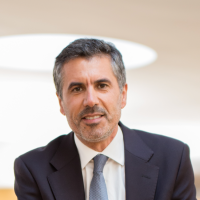Biography
José Fernando F. Mendes (born in Porto) is a Portuguese physicist (statistical physics) and professor of physics, best known for his work and contributions to the field of network theory. Graduated from University of Porto in 1987. He earned a PhD in March 1995 from the same University, the title of the thesis was “Dynamics of spins systems”.
Mendes was head of the Physics Department from December 2004 to February 2010 at University of Aveiro. From October 2009 to February 2010 he was director of the Associated Laboratory of the Institute of Nanostructures, Nanomodelling and Nanofabrication (I3N).
From February 2010 to February 2018 served as vice-rector for Research and Doctoral Studies at the University of Aveiro.
Mendes was the President of the Complex Systems Society (2021 – 2024) and is the Director of the i3N-Aveiro since September 2023.
Mendes is known for his research on complex networks, and in particular for work on random graph theory, phase transitions, multiplex networks, percolation theory, and network epidemiology. He proposed with collaborators the idea of aging on networks, generalization of preferential attachment, pseudo-fractal networks, hybrid phase transitions, explosive phase transition nature, spectral analysis, k-core, and random walks on networks.
Mendes received the following Prizes/Awards:
Prize Gulbenkian Ciência Gulbenkian Prize (2004).
Inducted member of Academia Europaea in 2012.
Member of American Physical Society (APS) (2017).
Member of Sociedade Portuguesa de Fisica.
Member of The Complex Systems Society.
Fellow of the Network Science Society (2019): “For profound contributions to network science that includes elucidating the consequences of preferential attachment, node aging, eigenvalue spectra, and critical phenomena in complex networks.”
Fellow of the American Physical Society in 2020.[1]
Litoral Awards Prize “Research” (2020) [5]
Senior Prize [6], Complex Systems Society (2020): “for his seminal contributions and the many further developments of the theory of Complex Networks.”
Topics
- Information Theory / Complexity Measures / Foundations of Complexity Sciences
Affiliations
- University of Aveiro
